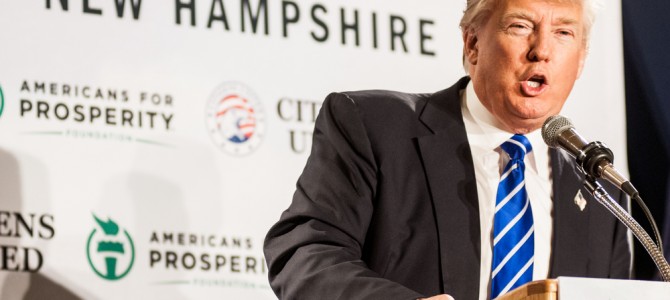
I woke up a few mornings ago to discover that Donald Trump is at it again, going after Megyn Kelly of Fox News. This most recent Twitter rant, apparently prompted by Kelly’s handling of an interview with Cornel West on the topic of immigration, included an appraisal of Kelly’s physical appearance after she returned from vacation (“She came back looking like Nancy Grace”) and a fresh reference to her as a “bimbo.”
Such a way with words this man has. I can’t wait to hear the soaring eloquence that is bound to become a trademark of his presidential oratory.
Oh, wait. I forgot. Rhetoric that takes us out of ourselves and lifts us from the drudgery of the day-to-day to ponder weightier concerns is so yesterday. These days the highest virtue is apparently straight talk, something Trump appears to dish with the biggest spoon around.
I get it. After almost two full terms of empty rhetoric from the Palaverer-in-Chief, voters are looking for something else. But here’s the thing. I think some of us are a little confused about the meaning of straight talk. Straight talk is just that—talk that gets from Point A to Point B in the most direct way possible. Contrary to what some seem to think, it is not synonymous with insults and potty talk. Those are in fact distractions from the desired straight path, not aids to it.
Beating Political Correctness Requires More than Brash Words
About 70 years ago George Orwell wrote an essay that still matters today. I first read “Politics and the English Language” as a freshman in college. It had a profound effect on me then, and I have returned to it repeatedly over the years. Without using the term “political correctness” Orwell identified the infection that still has hold of us today:
In our time it is broadly true that political writing is bad writing. Where it is not true, it will generally be found that the writer is some kind of rebel, expressing his private opinions and not a ‘party line’. Orthodoxy, of whatever colour, seems to demand a lifeless, imitative style. The political dialects to be found in pamphlets, leading articles, manifestos, White papers and the speeches of undersecretaries do, of course, vary from party to party, but they are all alike in that one almost never finds in them a fresh, vivid, homemade turn of speech.
The “fresh, vivid, homemade turn of speech” is a huge part of Trump’s appeal. He has described that appeal in terms of political correctness, suggesting that those who attack him are doing so because he is bravely flouting the PC police. But political incorrectness is not just about using blunt language. It is, even more, about standing up to The Machine, whether that machine is higher education, big government, public schools, or pop culture.
The politically incorrect heroes of our day are multitudinous but mostly unknown. They are the small-town students sitting in their college composition class who refuse to celebrate, on command, the Supreme Court’s codification of same-sex “marriage.” They are the Christian teenagers in high-school science class who dare to question their textbook’s presentation of evolution as settled science. And they are the small business owners and county clerks who say, in the words of Bartleby, “I would prefer not” not for the sake of getting attention but in spite of it.
Strangely enough, none of the above examples are characterized by loud bravado—“Look at me! I’m politically incorrect!”—but by the quiet going about of one’s business, come what may.
‘No Grandstanding, Just Quiet Strength’
A few years ago I was teaching English at a private, Midwestern college. During the week before classes started, in a meeting I was explicitly instructed, along with the rest of the English faculty, to teach in a way to make my students question everything they had ever been taught.
Now, I suppose this is not necessarily a bad approach. One of the tenets of any kind of inquiry is the importance of being open to every possibility, of not letting our presuppositions get in the way of learning. But the context for the remark above, made by the coordinator of the English department’s writing division, was that the following week we were going to be welcoming a lot of rural and small-town kids to our classes, kids who had been taught silly things like the Bible and traditional morality, and it was our job to disabuse the poor bumpkins of all that silliness. My response? “I would prefer not.” (P.S. I didn’t return to that school the following year.)
There is a story told of President Calvin Coolidge that, when as governor of Massachusetts he was preparing to sign an order calling up the National Guard during the 1919 Boston police strike, he was warned that act might irreparably damage his political career. His response, right before signing, was, “Perhaps you are right.” As Cal Thomas describes it, there was “no grandstanding. Just quiet strength.”
Oh where, oh where, is my Silent Cal of the 2016 presidential race? Maybe he or she can’t survive in the media melee that is twenty-first-century politics. Nonetheless, I will keep looking. I like political incorrectness as much as the next cultural salmon swimming upstream. But political incorrectness is not about having the loudest, brashest mouth in the room. It is not about calling people names, being a bully, telling stupid jokes, and generally being a jerk.
It is, rather, about speaking truth to power and being willing to suffer getting pounded by the rocks. It is about firmly saying “I would prefer not” while maintaining one’s good character, dignity, and respect for others. Trump, you can do better. Until you do, I as a Republican voter will continue looking elsewhere.









